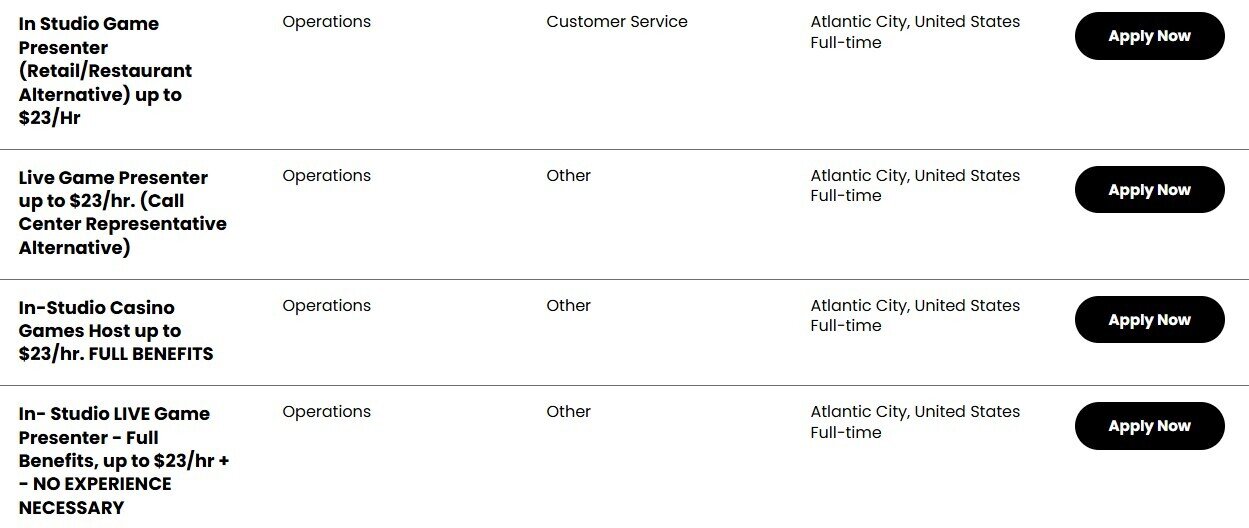How to Land a Live Dealer Job at an Online Casino

You don’t need a college degree or prior experience to begin a career as a live dealer at online casinos. The growth of iGaming and live-streamed table games has generated thousands of entry-level openings in regulated U.S., European, and Asian markets. These roles combine customer service, on-camera presentation, and basic game management, among other qualities.
This article covers everything from job requirements and application steps to salary expectations and real-world advice, so you can learn how to launch your live-dealer career with confidence.
What is a Live Dealer Online Casino Job?
Live dealers at online casinos host games via real-time HD video from a dedicated studio (or, in rare cases, from an approved home set-up). Players place digital bets online, while the dealer runs the physical game equipment exactly as they would in a land-based casino.
Dealers interact with players through chat and voice to create an engaging atmosphere, manage the game flow, and run the games themselves. This includes dealing cards, spinning roulette wheels, and hosting game-show titles. Live dealer online casino dealers also follow strict procedures to guarantee fairness, with results verified by independent auditors.
Live-dealer casinos usually offer a line-up that includes:
Knowing these fundamentals will help you understand the qualifications employers look for.
What Qualifications Do You Need?
Most live-dealer studios hire for attitude and presentation skills, rather than formal credentials. Typical requirements include:
Major providers like Evolution, Playtech, and Pragmatic Play train all new hires for 2–4 weeks, so prior dealing experience isn’t necessarily required.
How to Find & Apply for Live Dealer Online Casino Jobs
Landing your first live dealer job involves a strategic approach. You can follow these steps to improve your job search and application process.

Check iGaming suppliers’ career pages (e.g., “Evolution Careers,” “Playtech Jobs”) as well as general job boards like Indeed or LinkedIn.

Emphasize customer service, public speaking, and technology skills. List any retail point-of-sale (POS) or streaming experience (Twitch, YouTube, TikTok) to showcase tech comfort.

Studios assess your camera presence, diction, and energy. Record and review practice clips to refine delivery and presentation.

Join LinkedIn groups such as “iGaming Professionals” or Reddit’s r/casinos to learn about available studio openings.

Studios regularly expand, and submitting to several companies and positions increases your odds of getting a reply.

A brief email reiterating enthusiasm can keep your application on the minds of hiring managers.
Next, let’s explore what getting hired may look like.
What to Expect: Typical Daily Responsibilities & Work Environment
As a live dealer, your day revolves around hosting games and interacting with players. You’ll manage the game flow, ensure fairness, and maintain a lively atmosphere. Work environments vary, with some dealers working at in-person studios and others remotely.
A live dealer’s typical day-to-day routine looks something like this:
- Report to the studio, change into uniform, and receive table assignment.
- Host 20–40-minute “shows,” rotating between blackjack, roulette, etc.
- Interact with players via on-screen chat, announce game outcomes, and log any incidents.
- Take scheduled breaks to prevent on-camera fatigue.
Pros
- Interactive Work: Direct engagement with players worldwide.
- Entry-Level Access: Paid training and no degree or prior experience required.
- Growth Potential: Supervisor, trainer, or presenter roles are all available after a period of time.
Cons
- Irregular Hours: Overnight or weekend shifts are common.
- High Energy Demand: Must maintain continuous enthusiasm.
- Technical Glitches: Internet or software issues can interrupt streams.
Understanding your daily responsibilities prepares you for the next topic: salary expectations.
How Much Do Live Dealer Online Casino Jobs Pay?
The following table lists common roles within the online casino live dealer industry, along with expected salary ranges.
| Role | Typical U.S. Pay (2023) | Notes |
|---|---|---|
| Live Dealer | $14–$23 /hr base + tips (≈$32,000–$50,000/yr) | Evolution USA average $18 /hr. |
| Slot Operations | $12–$18 /hr | Primarily land-based roles. |
| Casino Supervisor | $45,000–$65,000 salary | Oversees multiple tables. |
| Game Developer | $70,000–$100,000 salary | Software/graphics positions. |
Earnings Tip: Choose peak-traffic shifts (evenings, weekends) when table tips are highest.
Since tipping etiquette plays such a big role in earnings, understanding how much to tip casino dealers can help you set realistic expectations for income, and increase your take-home pay.
With salary insights in mind, let’s look at career growth opportunities.
Where Can a Live Dealer Job Take You?
Starting as a live dealer can open doors to various career paths. The skills you’ll develop are transferable to many roles within — and outside — the gaming industry.
Skills like camera presentation, multitasking, and regulation compliance can potentially open doors to:
These opportunities highlight the potential for growth. Next, we’ll explore remote and in-studio work environments.
Comparing Work Environments — What’s Right for You?
Choosing between remote, in-studio, and hybrid setups depends on your preferences and lifestyle. While remote live dealer positions are somewhat rare, they do exist.
Each environment offers unique benefits and challenges.
| Environment | Pros | Cons |
|---|---|---|
| Remote (rare) | Flexibility; no commute | Licensing/security hurdles; strict home-studio specs |
| In-Studio (standard) | Professional lighting, cameras, support staff | Must commute to studio location; uniform policies |
| Hybrid | Occasional home hosting + studio shifts | May require travel on short notice |
With an understanding of work environments, let’s move to tips for excelling as a live dealer.
Insider Advice for New Applicants
To stand out as a live dealer, focus on developing key skills and understanding the industry.
While you may think you need to be a gambling expert to become a dealer at an online casino, the reality is that most studios teach you all of each game’s mechanics during paid training sessions.
Armed with these tips, let’s address some common questions about live dealer jobs.
Your Top Live Dealer Online Casino Job Questions Answered
Curious about becoming a live dealer? Here are answers to some frequently asked questions.
What is the average salary for a live dealer?
Glassdoor lists U.S. live-dealer salaries between $14 and $23 per hour, with many dealers reporting an extra $2–$6 per hour in tips.
Do I need prior experience to apply?
No. Most major providers offer 2–4 weeks of paid training.
What are the typical working hours?
Studios provide live dealer games 24/7, so expect rotating shifts that include nights and weekends.
Can I work from home as a live dealer?
A handful of jurisdictions temporarily allowed home studio dealers during the 2020 pandemic, but most operators have returned to dedicated studios for security and uniformity.
Where can I find job listings?
Check supplier career pages (Evolution, Playtech, Pragmatic Play) and job boards like Indeed, Glassdoor, and LinkedIn.
How can I improve my chances of getting hired?
Showcase customer-facing experience and shift flexibility on your résumé, and display an upbeat personality during interviews.
Ready to Start Your Live Dealer Career?
A live-dealer role offers an exciting entry point into the booming iGaming sector. From understanding job requirements to mapping out career advancement, you now have a potential roadmap to success.
Ready to audition? Explore current openings and take your first step toward the dealer’s seat. Share questions or experiences in the comments — your journey starts today!
Learn even more about this type of work environment by reading our guide on how live dealer casinos work.
 80%
80% 75%
75%
